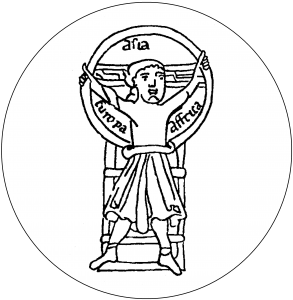Medieval Textuality and its Material Display
Medieval Textuality and its Material Display
Paris, 30th June-2nd July 2016
Keynote Speakers: Eric Palazzo (Université de Poitiers), Geoffrey Koziol (University of California, Berkeley)
For its 13th Annual Symposium to be held in Paris, the International Medieval Society invites abstracts on the theme of Words in the Middle Ages. The digital humanities, while altering the landscape of Medieval Studies as a whole, have most importantly overhauled the concept, appearance, and analysis of words and texts. Between the increasing use of paperless media forms and the rise in the number of digital collections, medievalists are seeking to adapt to these new means of producing knowledge about the Middle Ages. At the same time, scholars in this field are also trying to outline the methodological and historical issues that affect the study of words, which now simultaneously exist in the form of primary sources, codices, rolls, charters and inscriptions, digitally reproduced images, and the statistical and lexicographical data made possible by storage platforms and analytical tools.
In parallel with the digital humanities, the 13th Annual IMS Symposium on WORDS aims to return to words themselves and to probe the intellectual, technical and aesthetic principles that underpin their use and social function in medieval graphical practices. By analysing the material and symbolic properties of a particular medium; the conditions in which texts become signs; and scribal expertise, this symposium will address questions that initially seem simple yet which define the very foundations of medieval written culture. What is a word? What are its components? How does it appear in a given medium? What is the relationship between word and text, word and letter, word and medium, word and reader? In a Middle Ages forever torn between economic and extravagant language, what is the status of the word and what kind of elements – visual or acoustic, linguistic or extralinguistic – does it contain?
This IMS Symposium will thus explore (but is not limited to) four broad themes with a particular focus on medieval France, Francia and post-Roman Gaul:
1) Words and wording: medieval discourse on texts and writing; texts that reflect upon the act of writing (the poetic arts, prologues, colophons and signatures); the relationship between the writer (scribe, copyist, notary, stonecutter) and words, between copy and creation.
2) Words in and of themselves: the word between alphabetical symbol/grapheme and other symbols; images and sounds of words (nomina sacra, punctuation, poetic features); musical notation (naming/interpretation of neumes, litterae significativae); variations of meaning e.g. between mots and paroles; hierarchies of writing and of content.
3) Words and matter: the word and its format; the concept of the pagina, its definition, margins and limits, from manuscripts to inscriptions; the material turn and palaeography; writing and object, from book to amulet; the word beyond the text (images, heraldry, emblems, numismatics); impressions and the first printed texts, beyond the act of writing.
4) Beyond words: content-less words (pseudo-writing, pseudo-alphabets, pseudo-texts); word, name and identity; etymologies; word games and wordplay; the middle-ground between word and text (calligrams, anagrams, epigrams); the relationship between words and music (verse, prose etc. as expressed in melodies).
Through these broad themes, we aim to encourage the participation of researchers with varying backgrounds and fields of expertise: historians, specialists in the auxiliary sciences (palaeographers, epigraphists, codicologists, numismatists) art historians, musicologists, philologists, literary specialists…By bringing together a wide variety of papers that both survey and explore this field, the IMS Symposium intends to bring a fresh perspective to the word in medieval culture.
Proposals of no more than 300 words (in English or French) for a 20-minute paper should be e-mailed to communications.ims.paris@gmail.com by 30th January 2016. Each should be accompanied by full contact information, a CV, and a list of the audio-visual equipment that you require.
Please be aware that the IMS-Paris submissions review process is highly competitive and is carried out on a strictly anonymous basis. The selection committee will email applicants in February to notify them of its decision. Titles of accepted papers will be made available on the IMS-Paris website. Authors of accepted papers will be responsible for their own travel costs and conference registration fee (35 euros, reduced for students, free for IMS-Paris members).
The IMS-Paris is an interdisciplinary, bilingual (French/English) organisation that fosters exchanges between French and foreign scholars. For the past ten years, the IMS has served as a centre for medievalists who travel to France to conduct research, work, or study. For more information about the IMS-Paris and past symposia programmes, please visit our website: www.ims-paris.org.
IMS-Paris Graduate Student Prize:
The IMS-Paris is pleased to offer one prize for the best paper proposal by a graduate student. Applications should consist of:
1) a symposium paper abstract/proposal
2) an outline of a current research project (PhD. dissertation research)
3) the names and contact information of two academic referees
The prize-winner will be selected by the board and a committee of honorary members, and will be notified upon acceptance to the Symposium. An award of 350 euros to support international travel/accommodation (within France, 150 euros) will be paid at the Symposium.

